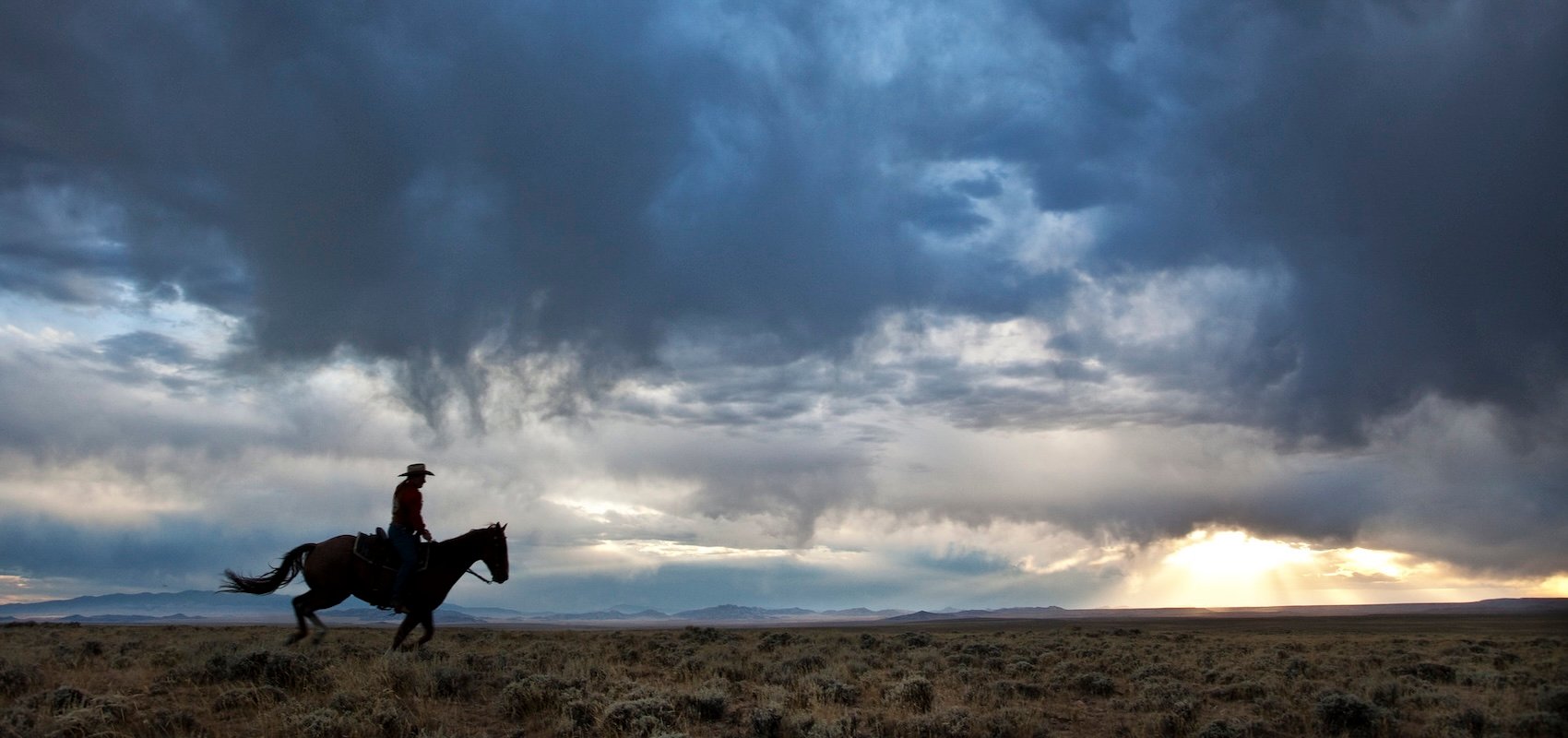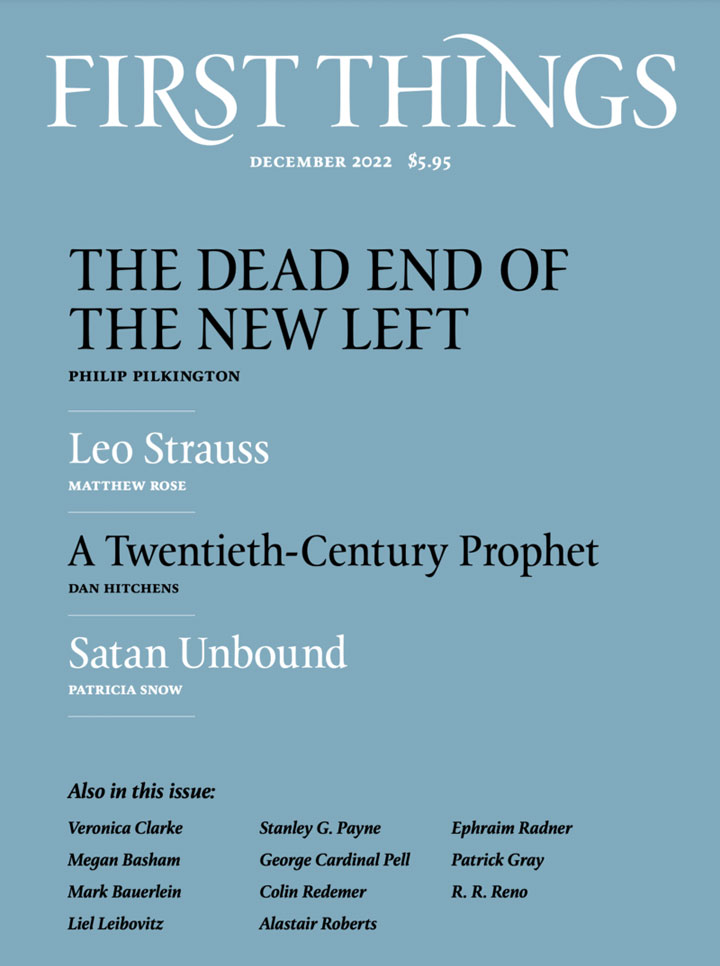
I was seventeen when my father and I embarked on the long flight to Denver from Amsterdam, with a layover in London. He read George Eliot; I read Batman: The Long Halloween. It was dark by the time we checked into the hotel, and still dark the next morning when we set out in our rental car. We drove north, then northwest, until, after six hours of lunar landscapes and windswept mountains, the little town of Lander, Wyoming, rose to meet us—as if, in the words of Gretel Ehrlich, “startled out of a deep sleep and thrown into a pure light.” The colors were electric. The sky was enormous. The air was dry and crisp as autumn leaves.
The reason for our journey: Wyoming Catholic College. We wanted to get a better sense of the place before I committed myself to four years in the indifferent, yawning landscape of Wyoming—where, as Ehrlich describes it in The Solace of Open Spaces, “men become hermits” and “women go mad.” Ehrlich banished herself to Wyoming after the death of a loved one. I suppose my college choice was similarly motivated, a self-imposed exile.
Born to an Austrian mother and an Australian father in Princeton, New Jersey, and having grown up in England and the Netherlands, I had long been fascinated by the American Catholic liberal arts college scene. My siblings and I were raised Catholic, and, given my American birth, I felt drawn to the U.S., admiring it from afar—an admiration fed by pop culture. I loved superheroes and comic books, uniquely American in their origin and mode of storytelling, and I believed in the ideal of the heroic everyman. Like Superman, I dreamed of being able to call the U.S. my home.
The U.S. happened to boast an interesting selection of institutions. I first experienced the Catholic liberal arts college scene when I participated in Christendom College’s summer program, and then again when I visited Thomas More College. Young men and women attended daily Mass and adoration, prayed the rosary together, and sang the Salve Regina. They read Tolkien and C. S. Lewis, smoked pipes and cigarettes, sang around bonfires, and chopped wood. People sat in the back of pickup trucks, and there was live country music and swing-dancing in barns adorned with string-lights. It was a strong contrast to the religious exposure I received at home, which consisted mostly of Mass on Sundays.
These communities were otherworldly—more religious than the post-Christian Europe I had grown up in. It felt strange to be among people my age who shared my faith. The international school I was attending in the Netherlands aimed to be religiously neutral—in other words, “secular.” But secularism has its own kind of creed. After a staff member found out that I was Catholic, he recommended that I read Richard Dawkins’s The God Delusion and told me to leave religion at the classroom door. Visiting speakers warned us of the dangers of unsafe sex, crying on stage as they spoke of the moment their lives were forever ruined, and then taught us to chant: “HIV and AIDS—we can beat it, take responsibility!” Upperclassmen distributed condoms as we exited the gymnasium, and we were taught how to apply them to test tubes.
Abortion and euthanasia were discussed in the classroom in terms of their “pros” and “cons.” One year, in the weeks leading up to the blandly named “Winter Concert,” at which I planned to perform “O Holy Night,” I was told that I had to change the lyrics of the entire song, lest I offend someone. I would have welcomed the celebration of all religious holidays and cultures over the whitewashing the school enforced in the name of inclusivity.
Wyoming Catholic appealed to me for several reasons: It was unapologetically Catholic; it featured a Great Books curriculum; and, unlike other Catholic liberal arts colleges, it had an Outdoor Program. I knew myself well enough to admit that I lacked discipline and needed to be forced into pursuing excellence—to read good books and expose myself to the (character-forming) elements. (Students are required to go on at least one outdoor trip each semester, ranging from backpacking to rock-climbing, canyoneering to mountain-biking. There’s also a horsemanship class.) My bedroom walls at the time were plastered with pages torn from National Geographic.
The last thing I wanted was to continue a secular, utilitarian education under fluorescent lights, where truth and beauty and goodness are subjective at best, delusions at worst. “It is the honor and responsibility of a Catholic university to consecrate itself without reserve to the cause of truth,” said John Paul II. That was what I wanted in a college.
Freshman year began with a three-week backpacking trip in the Wind River Mountains. We traversed saddles and crossed rivers, bandaged blisters and treated sunburns. We huddled together in the “lightning position”—crouched low and balancing on the balls of our feet, heels touching, arms outstretched—as rain battered our tents and thunder rattled our teeth. The days were hot; the nights were cold and clear as ice. I’d never seen stars so bright. (I remembered those nights when, a couple years later, I read Pascal’s Pensées: “[The] eternal silence of infinite spaces fills me with dread.”) We were told to stay away from pink snow, which tastes like watermelon but causes hallucinations, and not to pick flowers or create new paths; our footprint on the earth had to be feather-light, our existence nigh untraceable.
Nature puts you in your place. My muscles ached, and my knuckles and ears burned with sunspots. My inexperience forced me to rely on the kindness and patience of my classmates. I felt humbled and small. I’d also never felt more real.
In the classroom, we read, among others, Homer, Plato, Aristotle, Dante, Aquinas, Augustine, Flaubert, and Dostoevsky. We learned how to read well and write clearly. For homework, we sometimes had to read hundreds of pages at a time. We memorized poems, which shook me awake to a world “charged with the grandeur of God.” When I came upon a beautiful passage that made my heart race, I felt “like some watcher of the skies / When a new planet swims into his ken.” Beauty begets beauty; beautiful things compel us to write about them beautifully. We want to imitate them, to possess them. I was tearing new pages out of old books and plastering them all over my interior walls.
The truth and beauty I found in the humanities and theology—the assurance that “all shall be well, and all shall be well, and all manner of thing shall be well”—were things I’d craved since an unfortunate shift had taken place in my family. One September night when I was sixteen, my mother told me that she had fallen in love with another man. This was the beginning of a long, chaotic, and painful divorce, which was finalized right before my sophomore year of college.
I felt betrayed by the hypocrisy of my moral mentors, who had introduced me to a faith that proclaims the indissolubility of marriage. And I was not allowed to grieve. A neighbor yelled at me from the street for not being more understanding of the situation, as my grief was viewed as a reproach to my parents. My friends could not understand my frustration, as they felt that it was the right of adults to leave their children. Secular society’s seeming indifference to divorce and the collapse of the family left me reeling, feeling that I was stumbling through a daylight horror story. We sold the family home, and the dissociation I often felt for being a “global citizen”—living in the Netherlands, spending summers in Austria and winters in Australia, dreaming of America, and feeling a deep nostalgia for an England I barely got to know—was heightened tenfold.
The culture shock I experienced in my first year at college was greater than I expected. The air conditioning was too cold. The streets were too wide. I couldn’t buy alcohol. Everyone knew how to drive. I’d never heard of John Wayne. My first time at the grocery store, I thought I was being offered free money when the cashier asked whether I wanted “cash back.” People kept asking me where I was from. My accent—an odd mélange—gave me away. I was from everywhere, and nowhere.
But—I was Catholic. Insofar as the Church tells us that we are pilgrims in this world, it seems to anticipate those who have no nation, or have too many. The Church offers an antidote to the shortcomings of globalism: the fruits and riches of a Catholic tradition, larger than any national heritage, spanning continents and centuries, and the promise of a new kingdom. My classmates and I had different backgrounds and came from different places, but we were bound together through our shared faith, our liberal arts education, and our common goal: to be together in heaven. The riches of the Western tradition—the literature, the art, the music—were our common heritage. We were all part of one, holy, catholic, and apostolic Church.
“Though my mother and father forsake me, the Lord will receive me” (Ps. 27:10). The change I underwent at Wyoming Catholic College was slow and subtle, the way water and wind carve out a canyon, the way a child is knitted together over nine months. The word “matriculation” derives from matrix, “womb.” Our alma mater makes us anew, unweaving and weaving us back together with the words we read and write, the friendships we make, the virtues we cultivate. Whereas my international school had dissolved all particularity of identity, rubbed out the beautiful traditions students brought with them, Wyoming Catholic did the reverse: It taught us to embody and live out the tradition we already, in often hidden ways, shared.

